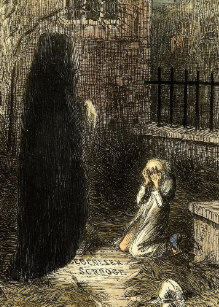Advent 3: Luke 3:7-18 and Philippians 4:4-9
Things fall apart. They do.
It’s the second law of thermodynamics: all closed systems move toward entropy, meaning they move toward disorder. Trees grow and then they die, falling apart in decay, feeding other organisms. Stars form, they super nova, then explode into billions of particles shooting out into the void. Even our bedrooms tend toward disarray – leave them alone for a month, a year, and see what kind of mold grows on your walls. The universe expands and unravels without any help at all and what are we to do?
Rejoice in the Lord, always. And again I say,“Rejoice!”
I never appreciate being told I need to rejoice when things are falling apart. Buck up! Smile! Always look on the bright side of life! Accentuate the positive. Eliminate the negative. Latch on to the affirmative. Don’t mess with Mister In-Between.
It’s magical thinking to believe that happy thoughts will keep the bogie man at bay. Because things ARE falling apart all the time– second law of thermodynamics. It takes substantial energy to keep it all together. What for, if it’s just going to fall apart again?
Our theme today is joy – the pink candle – the moment in Advent that shifts our expectation from wishful thinking into excitement for what is coming. It’s the closeness of it, the shepherds hearing the good news from the angels that Christ is here, and then running toward the manger. It’s the movement toward the goal. It’s being next in line for the rollercoaster, it’s holding the acceptance letter to the college of your dreams, it’s saying yes to your beloved’s proposal to marriage. You’re not there yet, but you know it’s gonna be so good when you get there.
It’s a little bit of hope mixed with a little bit of fear, propelling us toward uncertainty.
And yet, there’s one thing for certain: things fall apart. Second law of thermodynamics.
It isn’t just physics, it’s also philosophical. Buddhist monk, Pema Chodron, writes that things are always in the process of coming together and falling apart. Relationships form and they fall away. Careers come and they go. Families are born and they die. Often we reject this because it’s painful – this falling apart. We ignore it or drink it away or divert our attention elsewhere. But at the end of the day, the loss remains. Chodron’s advice is to relax in the midst of chaos, to stay in that uncertainty and to learn not to panic.
Easier said than done, right?
She says we have an opportunity every day to sit with the undoing of our lives, to be present with our pain and to reflect on who we are in the middle of it all. What do we do with our emotions when things fall apart? Do we rail at the world? Do we blame everyone and everything that blew our lives apart? Her big question is whether we will add our aggression to a world already steeped in violence. Will we practice peace, or will we go to war with the inevitable?
In case you’re wondering, I’m not far away from today’s scripture. I promise.
John the Baptist begins like he’s going to war. “Brood of vipers,” he calls the crowd. Judgment’s coming. The axe will fall. Unquenchable fire is just around the corner. Things are falling apart and it’s your fault. Way to connect with your peeps, John.
As an aside, it’s important to note that John does not call the coming judgment God’s judgment. God does not wield the axe in his sermon. Things fall apart on their own accord. And often we do it to ourselves and to each other. Luke likely wrote this gospel after the Romans destroyed Herod’s Temple and sacked Jerusalem in response to Israel’s rebellion against the Empire. Luke is writing these words in retrospect of the falling apart of Jerusalem. Judgment indeed was coming, but not necessarily from God.
We attach a lot of our worst experiences to God. And that’s not fair to God. I will protest and protect God’s good name until my dying breath from folks who say that it’s God’s will that a child die from leukemia, or that God is responsible for the famine that kills an entire village, or that the poor we will always have with us – scripture that is consistently misquoted. A lot of what happens to us is up to us. It requires energy and intent and vision and dedication to hold things together for ourselves and for our neighbor. And unless you read the gospels differently than I do, that seems to be our call.
“What do we do, John?” the crowd asked. The tax collectors asked. The soldiers asked.
If you have more than enough, give to those who have none. Don’t charge more than you need to. Don’t threaten people. Don’t lie about them. Don’t squeeze money from them. Be satisfied with your house, your food, your family. Know that things will always fall apart – second law of thermodynamics – but you can do something to ease the pain of another. In this way we don’t panic when our world is falling apart. In this way we remove one more aggression in this world. In this way we practice peace.
But peace was last week. This Sunday’s about joy, right?
Rejoice in the Lord, always. And again I say,“Rejoice.”
Paul and John, more than most, knew what it meant that things fall apart. John’s words anger Herod enough that Herod has him beheaded. Paul writes from prison, living in uncertainty every day, wondering when his time with the executioner would come. And yet, John encourages the community that gathers around him – uplifting them, exhorting them to goodness. Paul offers words of gratitude and hope to his church in Philippi, regardless of his situation, regardless of his chains.
Both knew the Lord was near.
Oswald Chambers wrote,“Faith for my deliverance is not faith in God. Faith means, whether I am visibly delivered or not, I will stick to my belief that God is love.” John was not delivered from the sword. Nor was Paul. Things will fall apart for all of us, even to the end of our lives. The worst can and often does happen, and we will not be delivered just as Jesus was not delivered from the cross. Our faith in God, our baptism, our trust in a strong work ethic won’t deliver us from the uncertainty of our lives.
But hear the good news: Whether someone does it to us or we do it to ourselves or whether it’s a result of the second law of thermodynamics, when things fall apart God is near, God is love, and God necessarily walks with us through the darkness.
Our communities are filled with darkness. They are filled with pain and loss. Poverty lays waste to our children, robbing them of health care and education. Big businesses charge astronomical prices for vital drugs while at the same time outsourcing jobs overseas. Our government shot tear gas at families with children seeking asylum at our border. Lies are so thick in our politics, we don’t know what’s true anymore.
We are indeed a brood of vipers, breeding more and more snakes each day.
Things fall apart. Second law of thermodynamics.
What are we to do?
“Whatever is true, whatever is honorable, whatever is just, whatever is pure, whatever is pleasing, whatever is commendable, if there is any excellence and if there is anything worthy of praise, think about these things. Keep on doing the things that you have learned and received and heard and seen in me, and the God of peace will be with you.”
We’re not just to bury our heads in the sand and pretend things aren’t falling apart all around us. Paul isn’t telling us to stay on the sunny side of life. We aren’t just to “think”on these things. The Greek word is logizomai– it’s where we get the word logic. It means to take things into account, to count them toward something or someone, to regard and dwell on these things. Taking into account the good and noble in this world is not a means of escape, but a means of radically changing our minds, so that what we do becomes honorable, just, pure, pleasing, commendable, excellent and worthy of praise. It is choosing our way in the face of all that is falling apart.
Don’t be anxious, Paul says. Instead be the beauty you wish to see in the world. Do the justice that this world lacks. Walk beside and encourage those living in loss. Pray. Rejoice. Be grateful. Things are surely falling apart, but that doesn’t mean you aren’t loved and you can’t give love in return. It just means you are human and this is a fallible world.
I’m not here to give you pie-in-the-sky theology. Life, and the living of it, is hard. It’s also wonderful and crazy and out of control. I have hanging in my kitchen a quote from Frederick Buechner that says, “This is life. Beautiful and terrible things will happen. Don’t be afraid.” It’s comforting to know someone else is recognizes it too. I think the key to making it through the roller coaster is holding on tight to each other and holding on to faith in Emmanuel – God with us.
I’ve said I don’t believe in using God’s will as a weapon against humanity, but I also don’t believe in a passive God who watches us suffer and does nothing. I believe in a relational God – in a God who laughs with us, wonders with us, cries with us, and ultimately dies with us. God enters this relationship hoping that we will change, and knowing that God will be changed as well.
Love does that. Our love changes God in the same way as God’s love changes us. It’s the only thing that makes sense when things fall apart. The whys and wherefores and what ifs don’t account for anything when it hurts. It’s the hand you hold that provides respite. It’s the arms that encircle you that provide support. It’s God’s presence that brings peace.
In this we find joy. We can shift our thinking from dread of what will come to excitement for what’s next.
Because it’s the holidays, I see Charles Dicken’s classic, A Christmas Carol, everywhere I turn. Ebenezer Scrooge is as joyless a character as has ever been written. He dreads the final spirit on that long night. He knows what’s coming – the Ghost of Christmas Yet to Come. He knows that things will fall apart and that the worst is waiting for him. Yet coming face to face with the second law of thermodynamics doesn’t destroy him. It gives him a new lease on life. It gives him permission to bring joy – to seek it out and live every moment in it. The inevitable doesn’t rob him of happiness, it frees him from gripping onto life so tightly, it opens him up to let a little entropy into his world, a little disorder, and it allows him to connect with friends and family who will support and love him when his time comes.
May we all find such joy this Advent. And God bless us. Every one.



Thanks Terry. Yes, things do fall apart and those that stand by you mean the world to you!